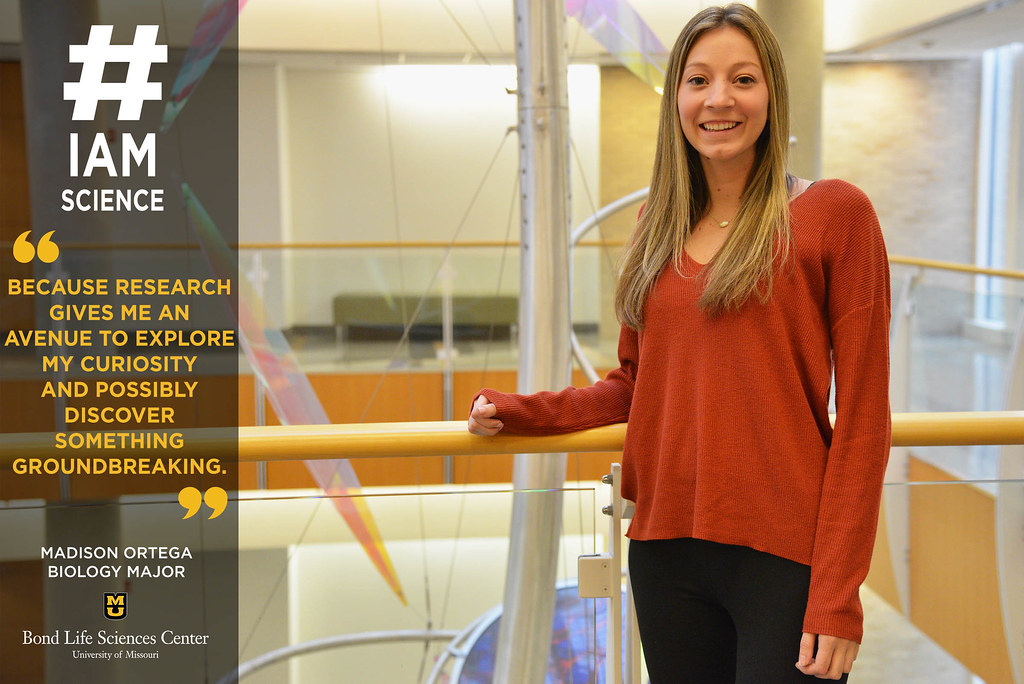
By Allison Scott | Bond Life Sciences Center
“#IAmScience because research gives me an avenue to explore my curiosity and possibly discover something groundbreaking.”
Research is all about discovering the answers to the unknown, pushing boundaries and exploring the depths of the field. As a junior biology major, Madison Ortega is already getting a taste of that.
Her freshman year, Ortega got a brochure for the Maximizing Access to Research Careers/Initiative for Maximizing Student Diversity (MARC/IMSD) program. This program encourages students to get involved with science even if they have had little exposure to it previously. Its ultimate goal is to provide a foundation of advanced science skills for minorities that can be applied to higher degrees within the field.
“I got to start exploring research right away through IMSD,” Ortega said. “It gave me the opportunity to look into various labs.”
Ortega landed on working in Cheryl Rosenfeld’s lab at Bond LSC because she felt she would have ample opportunities. That experience has led her to an individual project working on samples of spiny rats — an endangered species from Japan.
“The male doesn’t have a Y chromosome, so we’re trying to figure out how sexual differentiation occurs in the species without it,” Ortega said.
Through Bond LSC, she connected with Hokkaido University in Japan who donated the samples.
“They’re not fresh samples — they’re about 10 years old,” Ortega said. “But I showed interest in the project and ended up getting to work on it one-on-one with our lab mentor.”
In addition to her individual project, Ortega works with other undergraduates within her lab.
“We’re doing a variety of experiments that include social testing on mice,” Ortega said. “We do anxiety testing and also perform Barnes maze with the animals.”
These mazes and tests aim to see the impact of chemicals in the environment that mimic hormones like estrogen and impact animal growth and development.
“Basically, we’re trying to see how endocrine disruptors we feed the mice affect their offspring,” Ortega said. “We want to know how it affects them neurologically. In order to accomplish this, we are collaborating with various other groups in Bond LSC.”
Ultimately, they’re aiming to uncover if Bisphenol S (BPS) has any impact on the mice neurologically. These substances are similar to Bisphenol A (BPA), a chemical used as a hardener in production of plastics and in other manufacturing. As concern has raised over BPA, companies have replaced the chemical with BPS and others to allay public anxiety over its impact. But not much research has been done on BPS and its effect on animals.
“They may be found to have some neurological effects, so research is trying to uncover what exactly those are,” Ortega said. “The many tests we run will help us understand to the extent these chemicals are affecting us.”
After graduation, Ortega envisions herself continuing with research as a focal point of her career.
“I love research,” Ortega said. “My end goal is medical school, but I’m considering a program that combines a master’s degree with a Ph.D. in either dermatology or pediatrics.”
Regardless of her path, the lab work she does now leaves her prepared for the future.
“I spend a lot of time in the lab with my team and individually,” Ortega said. “It’s fun to have ownership of a project, and it’s also fun to work with other undergraduates and have camaraderie. I’m really fortunate.”

